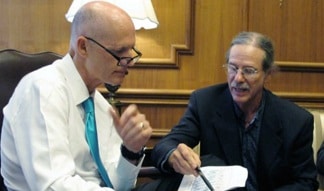Republican Florida governor Rick Scott has always had a huge problem when it comes to the environment. To begin with, he has repeatedly made it clear that he does not believe in climate change, and certainly not the role that human beings play in exacerbating the problem.
But, facing a fierce opponent with a stellar environmental record in this year’s gubernatorial race, Scott has had to swallow his pride and open up to the idea that he is wrong on climate change.
Governor Scott recently met with prominent climate scientists from universities with the expressed goal of learning all that he could about climate change. The truth, however, is that the entire experience was more of a publicity stunt than a science lesson.
According to the scientists, at least half of the thirty-minute meeting was spent with Scott asking questions about the scientists’ education, classes they teach, and various other “small talk” questions. This left them only 15 minutes to explain the science behind anthropogenic climate change to the inattentive governor.
Think Progress, via Reader Supported News, has more:
Ben Kirtman professor of atmospheric science at the University of Miami, told ThinkProgress. “I don’t honestly believe the governor is climate literate, and I don’t think he is particularly interested in becoming climate literate.”
David Hastings, professor of marine science and chemistry at Eckerd College, told ThinkProgress that he thought the governor’s decision to take up “almost half” the meeting with small talk showed that he wasn’t truly interested in the meeting.
“If we were talking about things that he was sincerely interested in, that small talk would have been very short,” he said.
They also note that during the entire meeting, Scott did not ask a single climate change-related question.
Scott had previously refused to meet with scientists to discuss the issue of climate change, but now that he is locked in a heated battle to retain his governorship, he appears to be more willing to give the public the appearance of action.
Recently, Scott announced his plan to invest more money towards environmental projects in the state of Florida if he is re-elected. And as a Think Progress article pointed out, Scott can use all of the help he can get to convince the public that he actually cares about the environment:
…as the Tampa Bay Times points out, the governor’s new plan runs contradictory to the governor’s previous actions and statements on environmental issues. For instance, the paper notes, Scott vetoed the $305 million annual funding for Florida Forever in 2011. The paper also notes that Scott’s funding for springs restoration is slated to be parceled out over 10 years, which extends the plan past his second term in office, leaving it to the mercy of whatever governor might come after him. The plan also doesn’t explicitly mention the threat climate change poses to Florida, a state that’s particularly vulnerable to sea level rise.
The plan also comes after Scott received criticism for a secret hunting trip he took to U.S. Sugar Corp’s King Lodge, as well as the $534,000 in contributions he’s accepted from the sugar company. Sugar cane fields are a major source of the phosphorus pollution that flows into the Everglades, which can lead to algal blooms that reduce the oxygen levels in the wetlands. The sugar industry in Florida has been accused of skirting payments to help clean up the phosphorus pollution in the Everglades, a move that several environmental groups say has passed an increased percentage of the cost of cleaning up the wetlands to taxpayers.
Scott’s environmental blind spot goes far beyond campaign donations and outings with Big Sugar.
Since becoming governor in 2010, Scott has made one wrong decision after another for Florida’s environment. To begin with, one of his first acts as governor was his refusal to join a multi-state lawsuit against oil giant BP for their role in the Deepwater Horizon disaster. Public backlash forced the governor to rethink his position on that matter.
Then you have the evidence of Scott’s budget cuts to environmental protection in the state. Since taking office, Scott’s administration has significantly cut funding for the state’s Department of Environmental Protection, rolled back tax funding of water management, and completely dismantled the Department of Community Affairs, a group that dealt specifically with local environmental concerns.
The financial cuts to environmental projects totaled more than $305 million in his first year in office alone.
Scott’s enforcement of environmental penalties is just as bad. Environmental investigations reported more than 2,000 environmental infractions on behalf of companies and individuals the year before Scott took office. That number has since dropped to fewer than 150 a year, a move that Public Employees for Environmental Responsibility (PEER) says is due to Scott’s administration failing to perform environmental reviews.
The scientists that Scott met with are spot on in their assessment that he does not care about climate change. Regardless of what the photo ops want us to believe, Scott’s actions show that this man is no friend to the environment.
Subscribe to our newsletter
Stay up to date with DeSmog news and alerts






